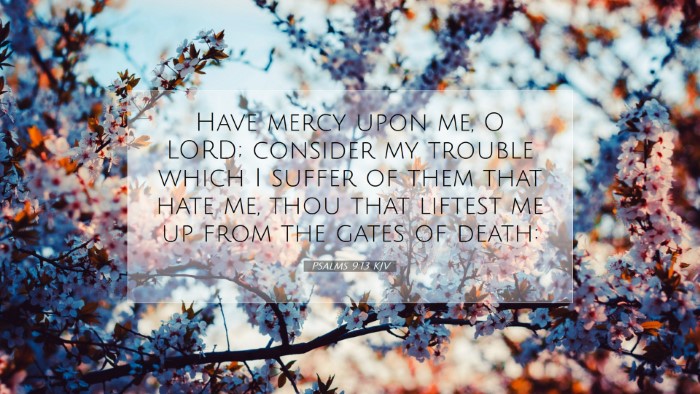Commentary on Psalms 9:13
Psalms 9:13 (KJV): "Have mercy upon me, O Lord; consider my trouble which I suffer of them that hate me, thou that liftest me up from the gates of death."
Introduction
This poignant verse serves as a cry for divine mercy in times of distress and persecution. The psalmist expresses profound anguish while appealing to the compassionate nature of God. By drawing insights from established public domain commentaries, we can explore the themes of mercy, suffering, and divine protection as they relate to this text.
The Cry for Mercy
Matthew Henry emphasizes the essential nature of mercy in the relationship between God and humanity. In his commentary, he notes that requesting mercy is not merely asking for forgiveness but appealing for assistance in times of need. The psalmist acknowledges his vulnerability, illustrating that true humility often precedes divine intervention.
Henry elucidates that acknowledging one's need for mercy reflects a deeper understanding of one's own limitations and the dangers surrounding them. It is a recognition that, without divine support, the psalmist cannot overcome the adversities posed by his enemies.
Understanding Suffering
Albert Barnes further expands on the context of suffering mentioned in this verse. He identifies the enemies as a major source of the psalmist's distress, highlighting that these adversaries represent forces that oppose the righteous. Suffering often leads believers to a place of desperation where they seek the Lord's intervention.
Barnes explains that the phrase "consider my trouble" reflects a plea for God’s attentiveness to the psalmist's plight. It embodies a desire for divine awareness and action, suggesting that the psalmist is convinced that God can deliver him from his troubles.
Divine Intervention
Adam Clarke adds to the discussion by elucidating the phrase "thou that liftest me up from the gates of death." This metaphor conveys a powerful image of rescue from the imminent threat of death, indicating that God not only hears but acts to preserve life. Clarke interprets this as an assurance that God can and will save the righteous from the very brink of destruction.
Moreover, Clarke points to the idea that being "lifted up" implies a restoration to a position of safety and honor. It is not merely a deliverance from physical dangers but also a spiritual elevation, one that underscores God’s protective hand over His faithful followers.
Theological Reflections
The theological implications of this verse are profound. In times of suffering, believers are reminded that God is both compassionate and powerful. This duality of His nature assures the faithful that no matter how severe their struggles, mercy is always accessible through heartfelt prayer and reliance on Him.
Moreover, this verse exemplifies the essential role of community in faith. The psalmist's plight serves not only as a personal lament but also as a communal reminder that collective prayer and support can elevate the struggles of the afflicted before God’s throne. It implores the faithful to acknowledge their dependence on divine mercy in all circumstances.
Application for Pastors and Theologians
For pastors, this verse offers a powerful framework for prayer ministry and support for congregants facing adversity. The emphasis on mercy and the invocation for consideration of one’s troubles can guide sermons, encouraging believers to bring their fears and sorrows before God openly.
Theologians may wish to explore the verses’ implications about the nature of God's mercy. How does this reflect the character of God in the context of suffering? This inquiry can lead to rich discussions about the attributes of God—particularly His grace and compassion toward humanity.
Conclusion
Psalms 9:13 serves as a reminder of the necessity of seeking God’s mercy amidst trials. By examining this verse through the insights of esteemed commentators like Matthew Henry, Albert Barnes, and Adam Clarke, we gain a deeper appreciation for the layers of meaning encapsulated in this heartfelt plea. It encourages a posture of humility and dependence on God, assuring us that He is both aware of our troubles and capable of lifting us above our circumstances.


